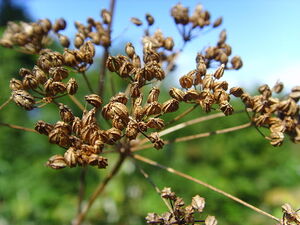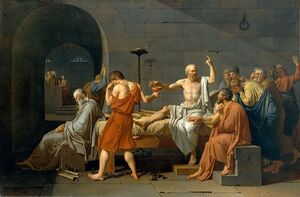Conium maculatum (nonfiction): Difference between revisions
No edit summary |
No edit summary |
||
| Line 1: | Line 1: | ||
[[File:Hemlock_seeds_late_summer_Devon_UK.jpg|thumb|Seeds of ''Conium maculatum''. Devon, United Kingdom.]]''Conium maculatum'' ('''hemlock''' or '''poison hemlock''') is a highly poisonous perennial herbaceous flowering plant in the carrot family Apiaceae, native to Europe and North Africa. | [[File:Hemlock_seeds_late_summer_Devon_UK.jpg|thumb|Seeds of ''Conium maculatum''. Devon, United Kingdom.]]''Conium maculatum'' ('''hemlock''' or '''poison hemlock''') is a highly poisonous perennial herbaceous flowering plant in the carrot family Apiaceae, native to Europe and North Africa. | ||
In ancient Greece, hemlock was used to poison condemned prisoners. | In ancient Greece, hemlock was used to poison condemned prisoners. | ||
| Line 15: | Line 13: | ||
Although many have questioned whether this is a factual account, careful attention to Plato's words, modern and ancient medicine, and other ancient Greek sources point to the above account being consistent with ''Conium'' poisoning. | Although many have questioned whether this is a factual account, careful attention to Plato's words, modern and ancient medicine, and other ancient Greek sources point to the above account being consistent with ''Conium'' poisoning. | ||
== | == In the News == | ||
== Fiction cross-reference == | |||
* [[Conius maculatus]] | |||
* [[Socrates (nonfiction)]] | * [[Socrates (nonfiction)]] | ||
== | == Nonfiction cross-reference == | ||
* [[Socrates (nonfiction)]] | * [[Socrates (nonfiction)]] | ||
External links: | |||
* [https://wiki.karljones.com/Conium_maculatum Conium maculatum] @ Wikipedia | * [https://wiki.karljones.com/Conium_maculatum Conium maculatum] @ Wikipedia | ||
Revision as of 05:04, 17 June 2016
Conium maculatum (hemlock or poison hemlock) is a highly poisonous perennial herbaceous flowering plant in the carrot family Apiaceae, native to Europe and North Africa.
In ancient Greece, hemlock was used to poison condemned prisoners.
The most famous victim of hemlock poisoning is the philosopher Socrates (nonfiction).
After being condemned to death for impiety and corrupting the Athenian (male) youths, in 399 BC, Socrates was given a potent infusion of the hemlock plant.
Plato described Socrates' death in the Phaedo:
The man...laid his hands on him and after a while examined his feet and legs, then pinched his foot hard and asked if he felt it. He said "No"; then after that, his thighs; and passing upwards in this way he showed us that he was growing cold and rigid. And then again he touched him and said that when it reached his heart, he would be gone. The chill had now reached the region about the groin, and uncovering his face, which had been covered, he said – and these were his last words – "Crito, we owe a cock to Asclepius. Pay it and do not neglect it." "That," said Crito, "shall be done; but see if you have anything else to say." To this question he made no reply, but after a little while he moved; the attendant uncovered him; his eyes were fixed. And Crito when he saw it, closed his mouth and eyes.
Although many have questioned whether this is a factual account, careful attention to Plato's words, modern and ancient medicine, and other ancient Greek sources point to the above account being consistent with Conium poisoning.
In the News
Fiction cross-reference
Nonfiction cross-reference
External links:
- Conium maculatum @ Wikipedia
- Conium maculatum @ Wikipedia

